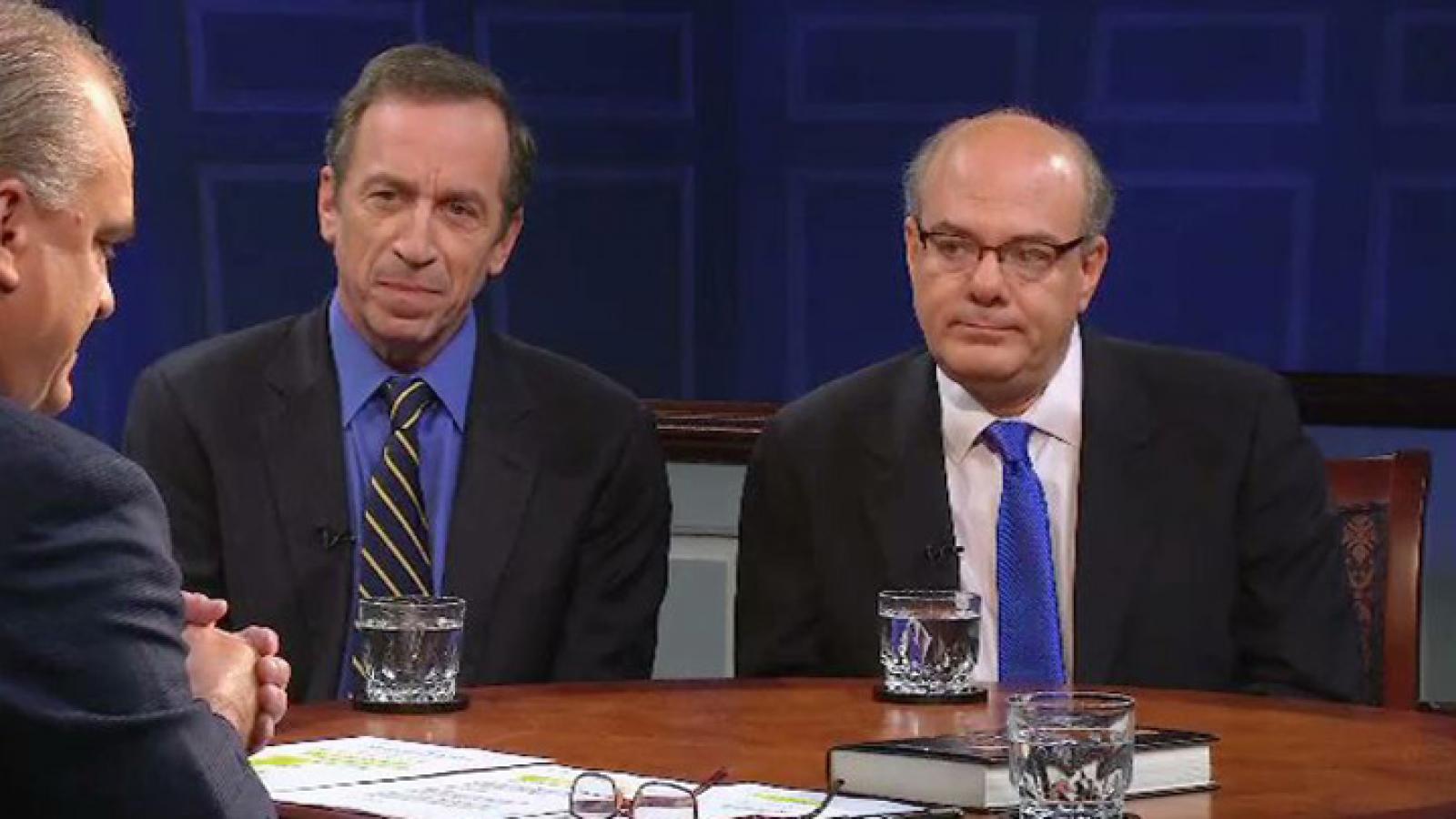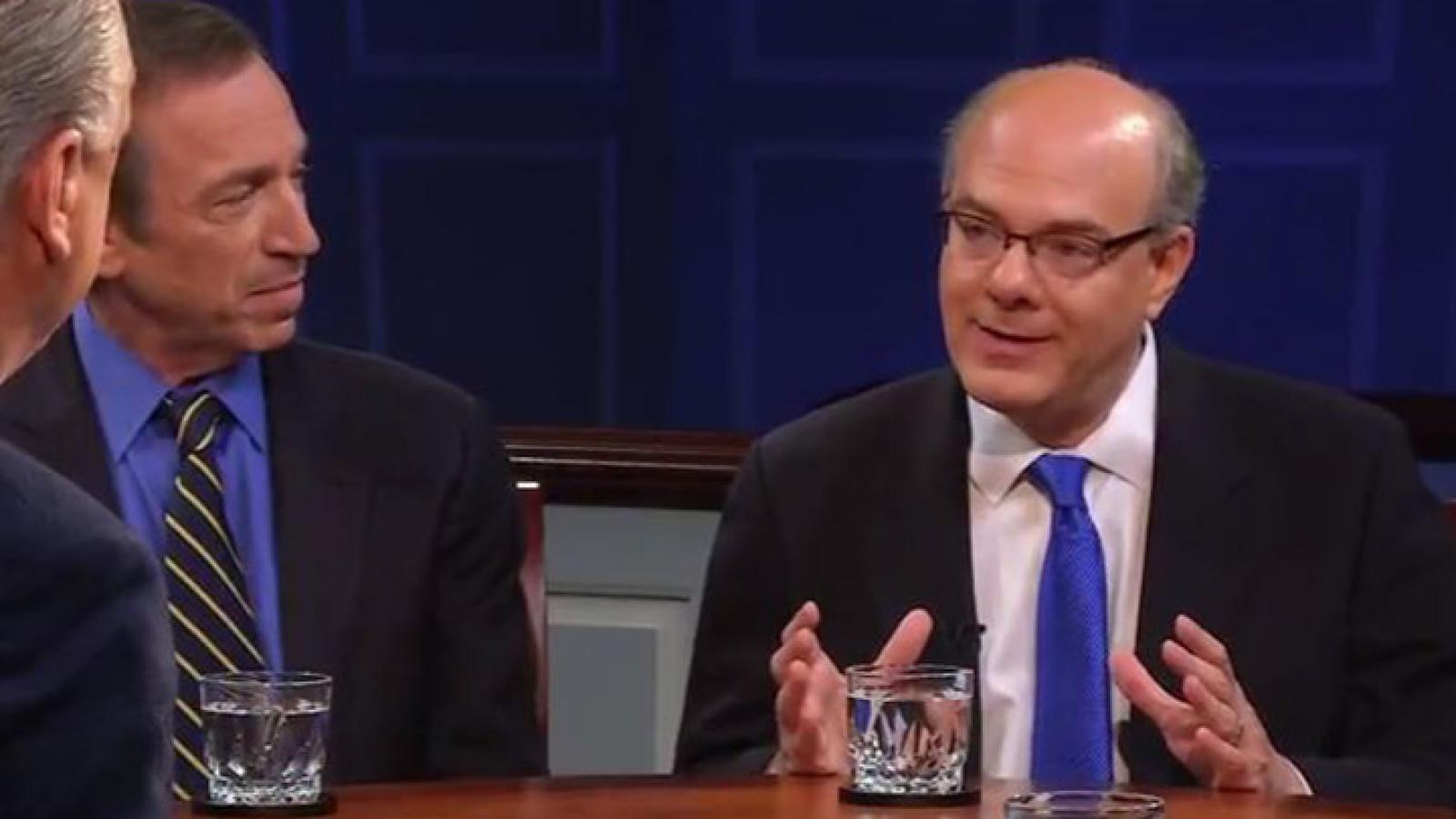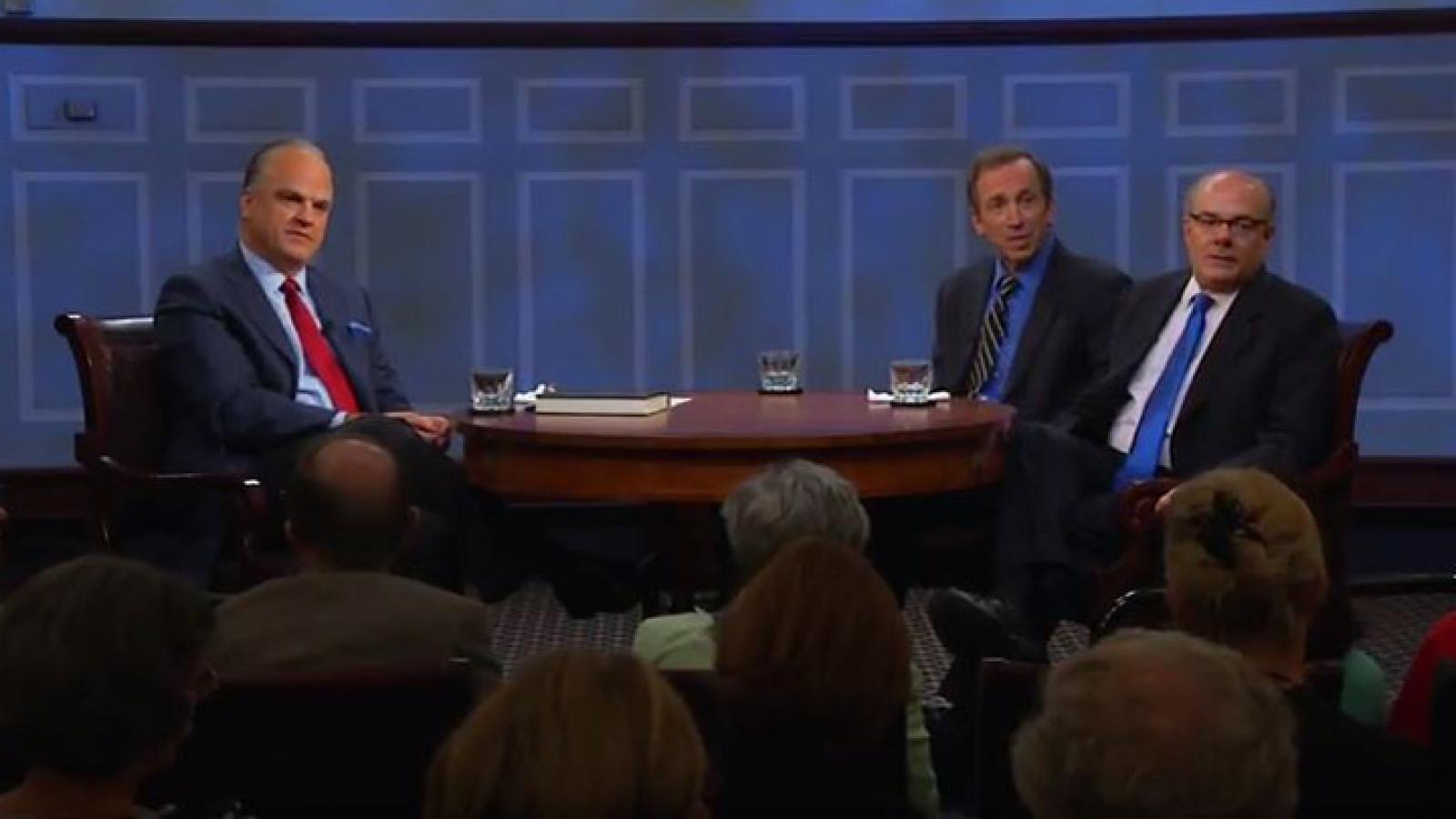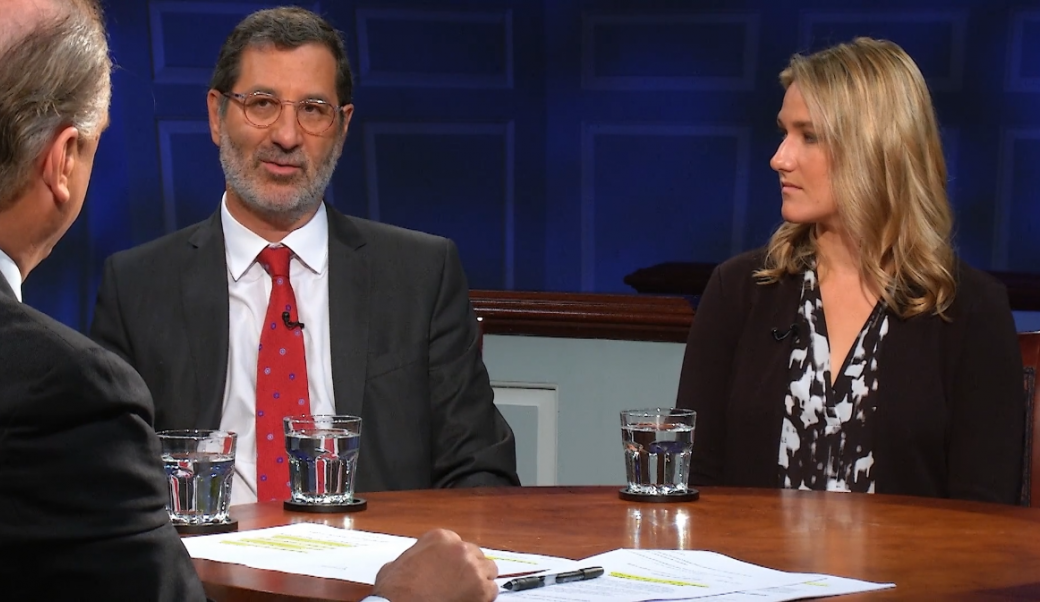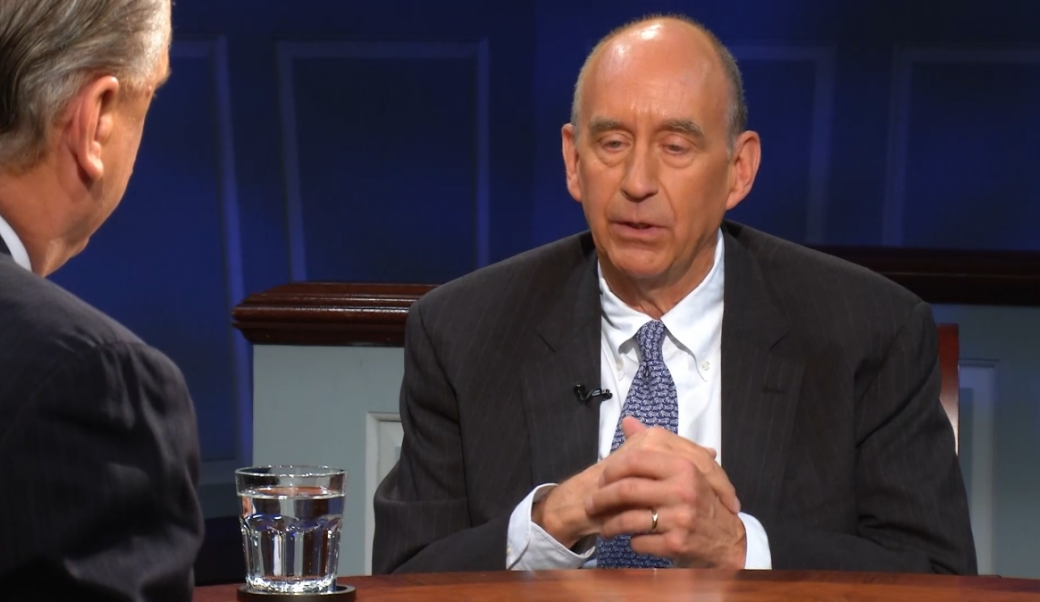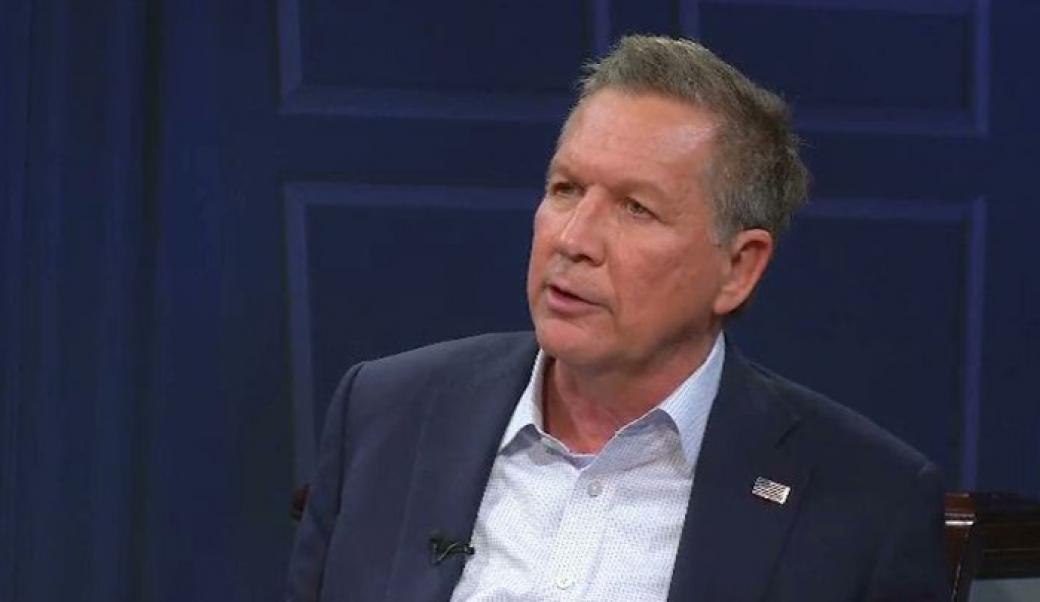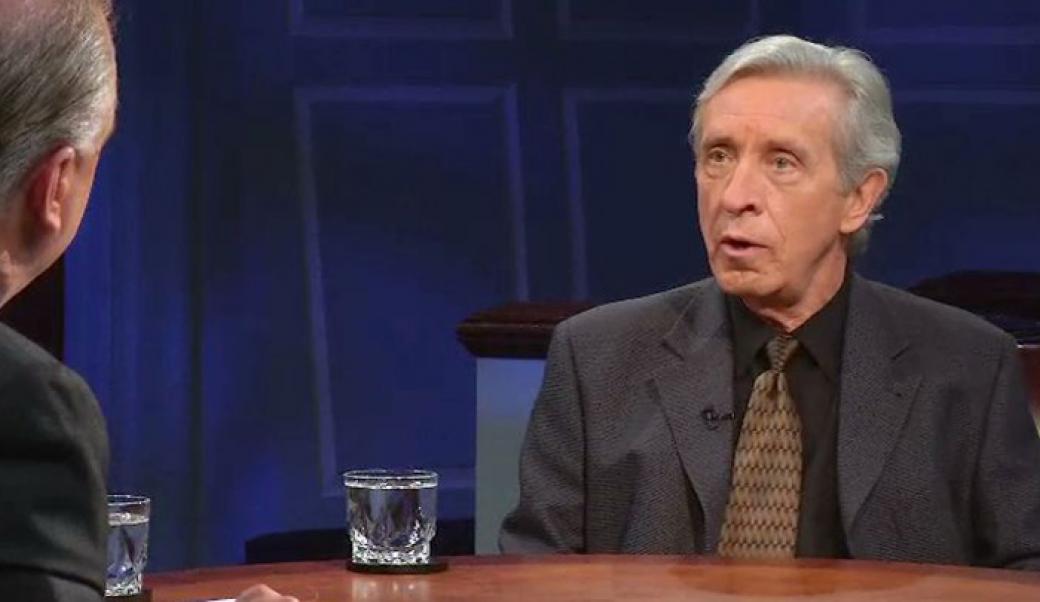About this episode
October 14, 2016
Michael Kranish and Marc Fisher
One of the biggest questions hanging over the 2016 presidential campaign is, “Who is Donald Trump?” In this episode, we try to answer that question, with the help of two Washington Post journalists, Michael Kranish and Marc Fisher. Along with an enormous team of other reporters and editors, they have just published a new biography of the GOP nominee: "Trump Revealed: An American Journey of Ambition, Ego, Money, and Power."
Transcript
0:50 Douglas Blackmon: Welcome back to American Forum. I’m Doug Blackmon. The single biggest question hanging over the 2016 presidential campaign—from the very beginning of the primaries—many months ago, through the current debate season and now the final days before the nation votes—has been a simple one. Who is Donald Trump? What does the Republican nominee, who a year ago hardly anyone believed could be a serious contender, really believe? What’s his true life story? Even his own social-media Twitter handle—@realDonaldTrump—echoes the question. His Republican opponents in the primaries accused him of not being a true conservative—or even a member of their party. Of being a supporter of Democrats—such as his current opponent, Hillary Clinton. Have his famous business successes been a sham? Is he simply a reality TV star with few fixed ideas about how to run the country—or is he a truly substantive and inspired leader of the people, with coherent ideas and instincts for the future of America. In this episode, we try to answer some of those questions, with the help of two highly respected Washington Post journalists, Michael Kranish and Marc Fisher. Along with an enormous team of other reporters and editors, they have just published a new best seller, a biography of the GOP nominee, titled: Trump Revealed: An American Journey of Ambition, Ego, Money, and Power. Thank you both for joining us.
Michael Kranish: Thanks for having us.
Marc Fisher: It’s a pleasure.
2:17 Blackmon: So I usually detest asking people what their title of a book means. I hate asking a writer, what does your title really mean. So I’m not going to ask you that. But your book appears to promise, Trump Revealed, promises us that you have revealed something about him that we didn’t already know. So what’s the big reveal?
Fisher: Well, I think the big reveal for me is, that he’s a much more complex figure than we’ve been lead to believe. You know If you’ve watched him through all of the last year, at the rallies and so on, you see a blustery guy, who speaks in very simple, declarative sentences, and you’d think well, maybe there’s not a lot going on there. And, in fact he’s really quite complex. Uh, psychologically, his business history is quite complex. He presents himself as this enormous success. Actually, his career is a series of hills and valleys and some very deep valleys. His personal life, he presents himself as this wealthy playboy. But the reality is much more interesting than that. He’s actually something of a loner, a solitary figure.
Kranish: There’s been a paradox about Donald Trump. He’s one of the most public figures of our age, and yet much about him has been hidden. He doesn’t want people who have worked with him to disclose what they know. He makes them sign non-disclosure agreements. Uh, he hasn’t revealed his tax returns, so we don’t know really if he’s as wealthy as he says he is; whether he’s given money to charity, and umm there’s a lot about him that is not known. So we really felt that telling the full story in a biography, that the character would reveal himself. And we got a lot of those people, who in fact did sign non-disclosure agreements to talk to us, and a lot of documentation. So that over the course of his life, and including the things that he said about himself, you get a much better sense of the character. And a lot, the biggest surprise to me personally, was just how deep the valleys were that Marc referred to on the business career. He had six corporate bankruptcies, an awful lot of difficulties, and yet he managed to have survived to this day.
4:10 Blackmon: And the contradictions that you get at in the book, I do think are central in trying to understand Mr. Trump. this individual who whether his successes have been as great as he says, nonetheless there have been these very, very significant business successes. He was a successful athlete as a young man, he was an obvious leader when he was a student.
FACTOID: Trump studied at University of Pennsylvania’s Wharton School
But also, these less obvious things. Where he appears to be a playboy, as you say, loves to surround himself with beautiful women, even when he’s married to one, likes to be surrounded by others. But other than that, relatively little evidence beyond certain specific things that we will get to, um, but in the end as you say, someone who wasn’t a drinker, wasn’t a drug user, but hanging out with people who were because he liked being in this glitzy setting, but then going home at the end of the night, and it would seem by himself most of the time.
Fisher: Yeah, you know one of those things that we looked at quite carefully, one of the things that Trump boasts about is that he’s never had a drink in his life. Well when you say never to a reporter, that raises all kinds of alarms, so we talked.
5:13 Blackmon: Dangerous superlative.
Fisher: Exactly, so we talked to a lot of people, at every stage of his life, from his classmates, his neighbors, friends growing up, all the way through his business associates, people were very close to him at various stages. And in deed he seems never to have had a drink in his life. Despite the fact the he hung out at the disco clubs of New York in the ’70s, uh, was really in a kind of cocaine filled scene uh in that period. Uh, but he was using that scene to build this character. Because he felt from the start, this was a really remarkable insight that he had, as far back as his early 20s, when he decided that his business success would be determined not so much by his skill at managing day to day, but by how well he did at creating an image that other people would aspire to emulate. And that image, was of this billionaire playboy, of to whom things came easily, who ruled by his gut, by his instinct. And this was an insight that he had at this very early age and continues to manage to this day. His great skill and the thing he spends the most time on, is managing and manipulating the media to create that image.
6:19 Blackmon: But that does touch on one specific detail that we won’t talk a lot about, but maybe was the only sort of soft moment captured in his personality, and that being about the death of his older brother. Who was an alcoholic and who must’ve in some respects, affected his decision, or affirmed his decision rather to never take a drink.
Kranish: Right, he told us, that was very instrumental in this thinking. That he saw what had happened to his older brother. You know, he had looked at his brother, he said he was a very handsome man, more handsome than Donald Trump himself, and that he thought that his brother would be the big success of the family.
FACTOID: Trump’s older brother, Fred Trump, died of alcoholism at the age of 43
Uh but his brother didn’t want to go into the family real estate business, decided, again, to be a pilot instead. And Donald sort of ridiculed that, and said you know “why do you want to be like a bus driver in the sky” um so it’s a very harsh comment, but so he looked at what happened to his brother and said, “I’m not going to be like that, I’m not going to drink and I’m gonna stay in the family business.”
7:11 Blackmon: You actually spent time with him, I should make a point at that, that you had multiple, what 20 hours total of interviews with Trump directly, (yeah), and uh, so let’s stop on that for a second. Uh, you guys are the named authors of this book, but you’re actually, this book is the product of a kind of new model in journalism, that the Washington Post I think is probably pioneering right now. Uh, where, you're both reports at the post, but this book is the product of a very large team of reporters and editors, and many of the things that are in this book have already been published along the way, stand-alone stories in the Post, but this brings all this together, uh, in a unique…
Fisher: Right, there’s a tremendous amount of material in the book that has not been in the Post, and then there’s some parts that have been. The way we did it, if you recall back in March, it wasn’t clear who the nominees were going to be. Normally when we do a biographical series about the presidential candidates, we’ll start a year, year and a half in advance, and have a couple of reporters preparing these stories. That was not an option this time around, and so we came up with this idea where we grab 25 of the best people in the news room, uh and put them on everything from his ancestry, and so we sent reporters to his ancestral home towns in Germany and Scotland. We sent people to examine his foreign businesses, in places like Azerbaijan and Panama and so on, all the way through his life. And those reporters fed us material, and we reported it on our own, and developed the book from that. At the same time, those reporters were using that same reported material to write stories, investigative pieces that appeared in the Washington Post.
8:41 Blackmon: And along the way you spent time with Trump, you guys in particular, spent time with Trump himself.
Kranish: And the reporters on the project. And the great beauty of being able to do this, was that we took a lot of threads of biography, really as many threads of a life together. And I think doing that, not just the stories, but everything fits together. You really get an understanding of why something that happened in 1989 is relevant today in 2016.
Fisher: We got a couple of real glimpses into that private side of Donald Trump, that more vulnerable side in our interviews. There was one point when I asked him how he was preparing to possibly be president. Are you reading the great presidential biographies, for example? And he paused for an unusually long time, and his voice became almost tender and he said, “you know, I’ve never read a biography but I’ve always wanted to, I’ve never had the time.” And so I thought, well that was interesting and so I pressed a little harder and I said well how are you preparing, how will you make decisions as president. And he said “well I’m not going to be reading any big reports or anything like that and he told me the story of how a guy from Wall Street came to him, wanted him to make a deal in China and said there was an innovative kind of financing that he wanted Trump to consider, and so Trump said, “well I don’t really know anything about that.” And the guy said “no problem, we’ve done some research. I have a report; I’ll send it to you today.” And Trump said, don’t send me any blanking reports, and said, cause I won't read them. And so I said, so how will you make decisions about complex issues that come before a president. And he said, people can come in, they can talk to me for 20 seconds, I’ll know what to do immediately, I’ll get it in my gut.
10:17 Blackmon: Alright, uh, there’s a quote, from Trump, that I think comes from an earlier biography of him, and I think this was his, partly his reaction, to the death of his brother but correct me if I'm wrong. Uh, but the quote was, Trump said, “man is the most vicious of all animals, you just can’t let people make a sucker out of you.” That was the line, there was a little more to it than that. But uh, this was in the context of not ever allowing yourself to be vulnerable to, anyone else in a sort of broad sense. But tell us about that quote and what you take it to mean; “man is the most vicious of all animals, you just can’t let people make a sucker out of you.”
Kranish: Well, he, Donald Trump is greatly formed by his relationship with Roy Cohn who was the attorney for Joe McCarthy in the Army-McCarthy hearings back in the ’50s.
FACTOID: Roy Cohn was key figure in 1950s McCarthy ‘Red Scar,’ died in 1986
Um and when Donald Trump and his father were sued by the fellow government for a race biased case in which they were accused of not renting to blacks, um, Roy Cohn told the Trumps, you must fight, hit back hit back ten times harder, or a one hundred times harder.
FACTOID: U.S. Government sued Trump firm in 1973 for housing discrimination
And that’s the philosophy that Donald Trump has kept to this day. Uh basically, his idea, and you see it in his campaign today, that if someone attacks you, go after them. That doesn’t matter if it’s the Goldstar family, for example, whose son was killed in action, uh that he will attack, and he just doesn’t want to sort of mute things, he wants to go after you if you go after him. And it’s the way he is. He has said that there’s a power of narcissism, he quotes a book, by that title, The Power of Narcissism. He calls himself an army of one. He calls himself a lone ranger. He believes that he is the answer and that you have to be basically plow forward no matter what. Even if you leave people behind you in your wake, even if you run roughshod over them, that that’s how you move forward. He said that when he has financial difficulties, he was looking out for Donald Trump, and that he had to survive and he would do what was necessary to survive.
12:04 Blackmon: And he also says in various places, you quote him in different ways, essentially saying that, that paraphrasing but, uh that in almost every question that faces any person, any leader, or business person, uh, that there are winners or losers, and you have to be one or the other. Essentially that there’s nothing else, that you either win or lose.
Fisher: His, Donald Trump’s mindset is a very binary one. People are either good or bad. They’re great or they awful, they're fabulous reporters or medial lowlifes. And so in every aspect of his life, he sees this. And you know, I think he's someone who grew up this way, in part because he had very cold and distant father, who was very directed about telling him in life you have to be a winner, you have to be a killer and that the greatest shame in life was to be a nothing. And he really took this to heart and wanted to surpass his father in very demonstrable ways. He thought his father had too small a vision of how to run his business. Having apartment buildings in Brooklyn and Queens, whereas Donald Trump thought Manhattan is the goal, that’s the place you need to be. His father said no, don’t take risks, never to go in debt, and Donald said, I'm going to be the king of debt. And so he set these sights for himself and decided he would never be seen as a loser.
13:24 Blackmon: You mention the cold relationship with his father, and describe it very well. It’s interesting to me, that over the course of the campaign season, the positive attribute of Mr. Trump, that I've heard expressed most often by voters, by just citizens, has often been his children. That his children are so impressive, they have such a visible presence in the campaign. Several times I’ve heard people say, something along the lines of, “anybody who’s got kids as great as those kids obviously are, must have done something right, must be a good, solid person.” And so it’s notable to me the way that you’ve described his relationship with his children as they were being raised in which he also was quite distant and not terribly involved particularly in the real parenting dimensions of their lives.
FACTOID: Trump has five children, three from his first marriage to Ivanka Trump
Fisher: There’s a real generational pattern that we saw there where as I said the father was cold and distant and really didn’t have a real relationship with Donald until Donald perhaps reached his mid-teens and was old enough and patient enough to come hang out at his father’s office and to learn with him the business. Go out with him rent collecting, go out with him to construction sites. That’s where the real bond was formed. Now that’s been repeated in the next generation where Donald again had very little to do with his kids when they were small. All three of his now adult children had a choice at one point about which parent to live with. They all chose their mothers. And so what happened was when they reached their mid-teens again the same thing. They came and started hanging out at the office, learning the family business. Donald would take them out to construction sites. Teach them the business. Introduce them to the foreman and so on and the bond again grew, one that is quite tight. And in fact when you go out to the Trump rallies and talk to the supporters there are many people who have many misgiving about Donald Trump and his personality and the coarseness of his language and the brashness of his ideas. But what they will often revert to is well look at those kids. Those kids are all right, and so they think that kind of says that there is some underlying goodness to Trump, that they want to trust him.
15:28 Blackmon: In many places there are intersections between Donald Trump’s business activities and the mob, organized crime. And that individuals who we’re believed to be or proven to be important crime figures, but who also in some way end up have something to do with a major Donald Trump project. One of which was when he was building Trump Tower, the sort of defining project. That there were apartments set aside, some of the most luxurious apartments, for the girlfriend of the mafia figure who controlled the labor rackets at the time.
Fisher: That girlfriend was the girlfriend of a mob figure who was instrumental in helping Trump build Trump Tower and some other projects as well. For his troubles, she received not only the apartment right below Donald’s in Trump Tower, but she insisted that that apartment be equipped with an indoor swimming pool. The building had not been built to support an indoor swimming pool, a very heavy thing. So they actually went in and rebuilt, stripped out the girders and rebuilt that portion of the building in order to support the swimming pool, and she had that apartment until such a point came when the boyfriend was indicted and convicted and then suddenly the apartment went away. But yes there were indeed two figures in Donald Trump’s early success, who helped him find the sites for his casinos in Atlantic City, who helped him with labor issues with the building of Trump Tower and other projects in Manhattan. Trump was aware at the time of their organized crime ties in part because he was aware that one of them was an FBI informant. And our colleague Bob O’Hara did some very important reporting looking into this and actually found and had extensive interviews with the retired FBI agent who ran that operation, and who was very keenly aware, met with Trump back in the day, keenly aware of how Trump knew what bad guys he was in with but Trump felt this was the way he was going to get those projects done.
17:28 Blackmon: I actually think that there have been a number of times along the way that there is a better defense for Donald Trump than what has often been often been offered in the discourse of the campaign. And so I want to work somewhat in defense of Donald Trump now and hear your reactions to some of this. But the first one was what you were just saying, that there have been this series of sort of shocking statement, shocking isolated statements, sometimes not so isolated. He’s said these racy things; he’s said things that were deliberately meant to inflame. But at the same time as you say, he’s a reality TV star. He was an impresario of professional wrestling and beauty pageants. Ya know, those are as much a part of his entrepreneurial activities as so much of this other work. In the end he has been an actor and a performer. We didn’t judge Ronald Reagan by the characters that he portrayed in the movies. Are we in some respects, have we gotten caught up in not just giving him a break, but perhaps overly condemning what are simply the habits of someone whose been a provocateur?
Fisher: Well you know Donald Trump throughout his life has built this one image, this one character, and whether you think that’s who he truly is or that’s a character he plays on TV that’s the one we have. Ronald Reagan was a labor union organizer, he was governor, he set up the state university system in California. He did a lot of things before he became president, so I’m not sure the analogy is quite right. But granted Americans love rogues. We’ve loved rogues through our entire history from Mark Twain, Will Rogers, all the way through today. And so we like them in our politicians too. There’s a little bit of rogue in Bill Clinton and certainly in Ronald Reagan even. So we like iconoclasts and Donald Trump fits that very neatly and we happen to be in a moment where there’s a craving for outsiders. That’s not new this year, that’s not something that Donald Trump brought to the scene. That’s the Tea Party, that’s the last several elections, that’s Barack Obama—hope and change. So I did a story recently, going out and looking, that may not seem very logical but there are a lot of Obama-Trump voters out there. And those are the hope and change people. Those are the people who were attracted to Obama because he was different, because he was not experienced, and because he was saying that he was going to change the system. And so a lot of those people, they may be disillusioned with Obama and have turned to Trump.
Kranish: So here’s Donald Trump. He’s never run for public office so obviously never held public office. He hasn’t done things like Mark mentioned about Ronald Reagan, but Donald Trump has run businesses, and he ran a number of them almost into the ground so that’s important to know. If you were looking at well what’s he done in his job experience? He did file six corporate bankruptcies. He said that it was four, but it was really six. Because he combines three together but they weren’t combined and so forth. So you have to look at that. Here’s his career. He created the public company and the ticker symbol was DJT, his initials. The shares at one point were 35 dollars. He made millions of dollars himself, but in the end the share was worth 17 cents and a lot of shareholders got very angry. So I think it’s very fair since there’s no public record of governance, what has he done when he’s run businesses? Which after all is his main calling card. Not the reality show, not the showmanship and so forth. This is what he’s selling, he’s saying I run businesses I win win win. Okay he certainly has won on many occasions. He built some great buildings, Trump Tower and so forth. But in fairness he’s also had a number of business catastrophes. After all, he wrote a book called The Art of the Comeback, so he had to have obviously fallen pretty deep to write that book. And we try to tell that entire story as well as he’s been in politics in certain ways for a long time. He’s changed his party affiliation seven times. So he’s not an ideological person the way a lot of other folks are. He’s been a Democrat, Republican, reform party candidate, independent, that’s important information to know as you’re making your decision about this person, and that can be an attraction to people. If you’re looking for an outsider, someone who’s not an ideologue, that would be attractive to you if you are looking for say you’re a conservative Republican, you only want that type of person whose been uniform his entire life then Donald Trump doesn’t fit that, but he has an explanation as to why that is.
FACTOID: Trump has registered with GOP, Independence Party,and Democrats
21:31 Blackmon: Is this someone who you will feel confident as citizens in the moment of a great national crisis?
Fisher: I don’t find him to be ah, ah, overtly dangerous. There are people who say oh, he would launch the missiles, whatever. I don’t see anything in his background that says he would be rash in quite that way. But he is prone to saying things ah, that are way beyond the pale of what we expect from politicians and what diplomats, you know, their country’s expect. He would be something novel and something that would raise all kinds of problems for us around the world.
Blackmon: Do you agree with that?
Kranish: Well, he has always relied on a very small circle of advisers. And even in this campaign he’s fired two campaign managers. So to be an effective president you’re going to inevitably ah face crises that you could never even imagine. We could sit here and talk for hours then on day one which he couldn’t have anticipated so having a very good set of advisors and cabinet officers and so forth would be crucial for Donald Trump. He doesn’t really have foreign policy experience for example. So you would have to look at the kind of folks he has around him whether you have confidence in that team as well. Are they just entirely yes men and yes women or are they people who could really be able to say to Donald Trump, which is not characteristic of his career that um that Mr. President, you’re wrong and you really shouldn’t do that. Umm, there would be a lot of cases where he would need that kind of advice.
Blackmon: Sounds like doubts.
Kranish: Well the whole campaign is you may have doubts, you have concerns and you try to raise those during the campaign. It’s up to really the candidate and we as journalists as you noted we’re not going to say you know you should or shouldn’t vote for someone because we really want to let the voters decide with this kind of book. You know what they see. But you have to look at the character of the entire person’s life and hopefully voters can take that and make that decision.
23:11 Blackmon: Last question. You talked about how much of the support Donald Trump has garnered comes from a cohort of Americans who feel like they have been left behind, feel like the system isn’t working for them anymore, the same folks who looked for an answer to that from Barack Obama, some who looked for that from Bernie Sanders. Donald Trump set up his campaign by publishing a book his last book that the title of it was Crippled America, again something that I don’t know that any prior presidential candidate could have had a book that said America was crippled and not have paid a penalty for that. But that’s what he’s tapping in to, a sense that the country is crippled by a lot of people. Is it plausible that he can make America walk again?
Fisher: Well it’s hard to see how he takes a campaign, as you say, a deeply negative view of where we are and who we are as a people at this point and flip that around and suddenly become the leader who will take us to a new place of optimism and sunshine. There’s not a lot of sunshine in Donald Trump’s description of America. If we do elect him it will be a pivot in a way that we’ve never turned before because Americans have always chosen the more optimistic candidate, the candidate with a vision of the future that is appealing to us. Donald Trump doesn’t offer that. He says we’re in a terrible spot, maybe we can make it a little better. It’s a very unusual approach and I’m not sure it’s one that Americans will embrace.
Kranish: Well his whole idea is that the country is in a very dark place and that things are just absolutely terrible. His slogan is “Make America Great Again.” So he wants to project that things are so bad only I, meaning Donald Trump, can fix things. And that’s the whole basis of his campaign that things have to be portrayed as absolutely terrible for his slogan to work.
Blackmon: Michael Kranish, Marc Fisher. You’ve written a remarkable book with a lot of your colleagues about a remarkable figure. Thank you for being here. The book is Trump Revealed: An American Journey of Ambition, Ego, Money, and Power. We hope you’ll keep this conversation going, at home, at work, with all the people around you. If you’d like to send us a comment or join an ongoing conversation about the presidential campaign, go to the Miller Center Facebook page, or follow us on Twitter. My handle is @douglasblackmon. To watch other episodes of American Forum, share them with your friends, join our email list, or read a transcript of this dialogue, visit us at millercenter.org/americanforum. I’m Doug Blackmon. See you next week.
